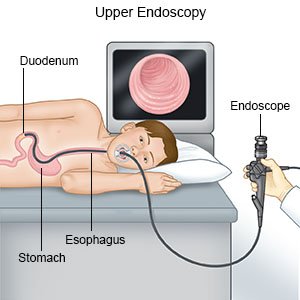Upper Endoscopy in Children
Medically reviewed by Drugs.com. Last updated on Aug 4, 2025.
An upper endoscopy is also called an upper gastrointestinal (GI) endoscopy, or an esophagogastroduodenoscopy (EGD). Your child may feel bloated, gassy, or have some abdominal discomfort or distention. Your child's throat may be sore for 24 to 36 hours after the procedure. It is normal for your child to spit up a small amount of blood. Your child may burp or pass gas from air that is still inside the body after the procedure.
 |
DISCHARGE INSTRUCTIONS:
Call your local emergency number (911 in the US) if:
- Your child complains of pain in his or her chest.
- Your child has trouble breathing.
Seek care immediately if:
- Your child feels dizzy or faints.
- Your child has trouble swallowing.
- Your child has severe throat pain.
- Your child's bowel movements are very dark, black, or you can see bright red blood in them.
- Your child's stomach is very painful, feels hard, and is larger than usual.
- Your child vomits blood.
Related medications
Contact your child's doctor if:
- Your child has a fever or chills.
- Your child cannot pass gas.
- Your child does not have a bowel movement for 3 days after the procedure.
- Your child has nausea or is vomiting.
- Your child's skin is itchy, swollen, or he or she has a rash.
- You have questions or concerns about your child's condition or care.
Care for your child:
- Limit your child's activity after the procedure. Have your child lie on the couch or rest quietly until the day after the procedure. He or she may feel tired and need frequent naps. Your child can take short walks to the bathroom or around the house to help pass gas. He or she should not play sports or do vigorous activity after the procedure. Your child may be able to go to school or return to daycare the day after the procedure. Ask your healthcare provider when your child can return to normal activities.
- Relieve your child's gas and discomfort. Have your child lie on his or her left side. Your child may need to take short walks to help move the gas out. Give your child small meals until the bloating has gone away. Start with clear liquids such as juice without pulp. If your child does okay with clear liquids, start with his or her usual foods. Ask your child's healthcare provider if your child needs to be on a special diet.
- Relieve your child's sore throat. Give your child crushed ice or flavored ice pops.
Follow up with your child's doctor as directed:
Write down your questions so you remember to ask them during your visits.
© Copyright Merative 2025 Information is for End User's use only and may not be sold, redistributed or otherwise used for commercial purposes.
The above information is an educational aid only. It is not intended as medical advice for individual conditions or treatments. Talk to your doctor, nurse or pharmacist before following any medical regimen to see if it is safe and effective for you.
Further information
Always consult your healthcare provider to ensure the information displayed on this page applies to your personal circumstances.
